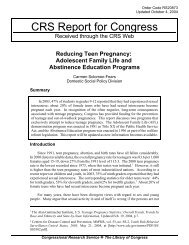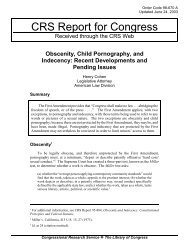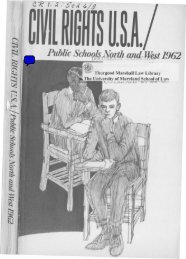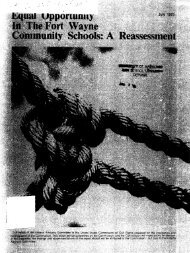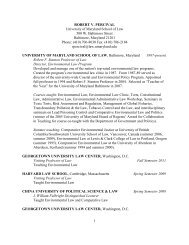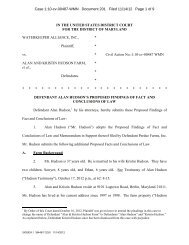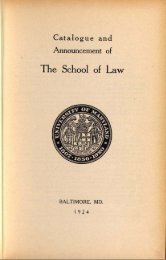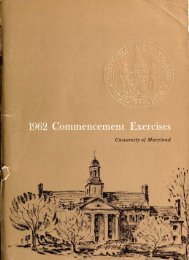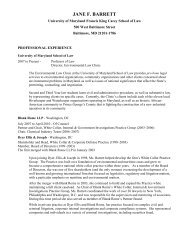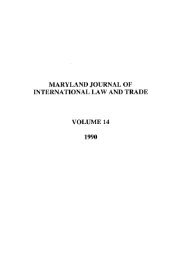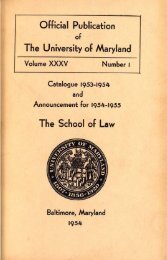University of Maryland School of Law : Catalog, 1988-1989
University of Maryland School of Law : Catalog, 1988-1989
University of Maryland School of Law : Catalog, 1988-1989
You also want an ePaper? Increase the reach of your titles
YUMPU automatically turns print PDFs into web optimized ePapers that Google loves.
Legal Writing* (3)<br />
Students enrolled in this course<br />
normally prepare a substantial<br />
number <strong>of</strong> short written exercises<br />
which do not require significant research.<br />
Instruction takes place in<br />
small groups or in a one-on-one relationship.<br />
Emphasis is placed on<br />
clarity, thoroughness and organization.<br />
The primary function <strong>of</strong> the<br />
course is to <strong>of</strong>fer additional instruction<br />
in writing to students who<br />
want to improve their writing skills<br />
and is strongly recommended for<br />
those who have difficulty in legal<br />
writing in the first year or who do<br />
not expect to obtain other legal<br />
writing experience prior to doing<br />
the written work intended to satisfy<br />
the writing requirement for<br />
graduation.<br />
(LAW 504 D)—Mr. H. Smith;<br />
Summer <strong>1988</strong>—Ms. Powers.<br />
Legislation Seminar* (3)<br />
This seminar is designed for students<br />
to develop an appreciation<br />
and understanding <strong>of</strong> the role <strong>of</strong><br />
statutes and the legislative processes<br />
in the United States Congress<br />
and the state legislature in relationship<br />
to the legal system. The<br />
seminar devotes attention to statutory<br />
interpretation, drafting techniques,<br />
code revision, the "legislative<br />
role" <strong>of</strong> the courts,<br />
interpretation <strong>of</strong> legislative authority<br />
and legislative procedure and<br />
process. Each student is required to<br />
prepare a research paper concerning<br />
a legislative issue or problem <strong>of</strong><br />
86<br />
interest and to draft proposed legislation<br />
for its solution. To the extent<br />
possible, these papers are directed<br />
to problems <strong>of</strong> current<br />
import and concern in the United<br />
States Congress, the <strong>Maryland</strong><br />
General Assembly, the Baltimore<br />
City Council or a municipal or<br />
county legislative body.<br />
Day (LAW 544 C)—Mr.<br />
Aisenstark. Evening (LAW 544<br />
H)—Mr. Bereano.<br />
<strong>Maryland</strong> Journal <strong>of</strong><br />
International <strong>Law</strong> and Trade<br />
(Dor (2)<br />
Upon recommendation <strong>of</strong> the journal's<br />
faculty advisors, students may<br />
receive credit (graded on a pass/fail<br />
basis) for journal work as follows:<br />
the editor-in-chief may receive up<br />
to two credits per semester; the executive,<br />
managing, articles and<br />
two notes and comments editors<br />
may receive up to two credits per<br />
semester; the book review editor<br />
may receive one credit per semester;<br />
the assistant editors and senior<br />
staff, whose total number may<br />
not exceed eight, may receive one<br />
credit; and the second-year staff,<br />
whose total number may not exceed<br />
15, may receive one credit<br />
each upon completion during the<br />
year <strong>of</strong> a substantial piece <strong>of</strong> written<br />
work <strong>of</strong> publishable quality.<br />
Each staff member must also fulfill<br />
other work requirements in order<br />
to earn credit. The total number<br />
<strong>of</strong> credits granted for work on the<br />
journal may not exceed 21 per semester<br />
for third-year students and<br />
15 per semester for second-year<br />
students. See also page 28 for additional<br />
descriptive information.<br />
(LAW 518 D)—Faculty Advisor.<br />
<strong>Maryland</strong> <strong>Law</strong> Forum (l)or<br />
(2)<br />
Upon the recommendation <strong>of</strong> the<br />
faculty advisor to the <strong>Maryland</strong><br />
<strong>Law</strong> Forum, four staff members <strong>of</strong><br />
the <strong>Law</strong> Forum may receive one<br />
credit per semester (graded on a<br />
pass/fail basis), but the maximum<br />
number <strong>of</strong> credits such students<br />
can earn is six. The editor-inchief,<br />
the managing editor and two<br />
associate editors <strong>of</strong> the forum may<br />
receive two credits per semester, up<br />
to a maximum <strong>of</strong> six. No credit is<br />
awarded to any student until a<br />
publishable paper has been written.<br />
In addition, each student desiring<br />
credit must have adequately<br />
performed the general duties incident<br />
to publication <strong>of</strong> the <strong>Law</strong> Forum,<br />
i.e., editing, source checking<br />
and pro<strong>of</strong>reading. See also page 27<br />
for additional descriptive information.<br />
(LAW 529 O—Faculty Advisor.<br />
<strong>Maryland</strong> <strong>Law</strong> Review (1) to<br />
(4)<br />
Upon recommendation <strong>of</strong> the review's<br />
faculty advisor, students may<br />
receive credit (graded on a pass/fail<br />
basis) for <strong>Law</strong> Review work as follows:<br />
members and assistant editors<br />
may receive one credit per semester;<br />
the managing, research and<br />
executive editors may receive up to<br />
three credits per semester; the<br />
editor-in-chief may receive up to<br />
four credits per semester; and all<br />
other named editors may receive<br />
up to two credits per semester. See<br />
also page 27 for additional descriptive<br />
information.<br />
(LAW 509 O— Faculty Advisor.



